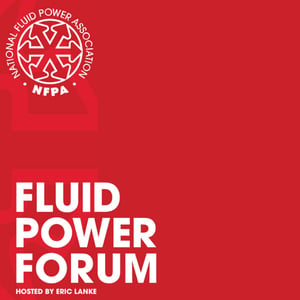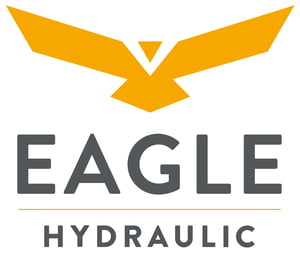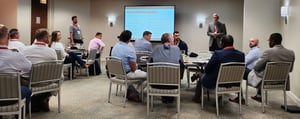Latest News
Please Complete and Share Survey on Fluid Power Capability Improvements for Industrial Markets
Start ReadingNew Episode of Fluid Power Forum: The Future of Fluid Power
Start ReadingNFPA Distributor Council Open Meeting Provides Guidance for Future Conference Programming
Start ReadingMeet a Fluid Power Scholarship Winner – Sarah Witte
Start ReadingOxford Economics Spring Fluid Power Forecast Out Now
Start ReadingTennessee State University Kick's Off First Event as NFPA Power Partner
Start ReadingNAM Regulatory Update: Timmons: The Stakes for Manufacturers Could Not Be Higher
Start ReadingFirst Sessions Confirmed for NFPA Hydraulics Technology Conference at iVT EXPO USA 2025 - Submissions Still Being Accepted
Start ReadingPlease Complete and Share Survey on Fluid Power Capability Improvements for Industrial Markets
Start ReadingNew Episode of Fluid Power Forum: The Future of Fluid Power
Start ReadingNFPA Distributor Council Open Meeting Provides Guidance for Future Conference Programming
Start ReadingMeet a Fluid Power Scholarship Winner – Sarah Witte
Start ReadingOxford Economics Spring Fluid Power Forecast Out Now
Start ReadingTennessee State University Kick's Off First Event as NFPA Power Partner
Start ReadingUpcoming Events










Latest Podcast Episodes

Today, our guest is Ernie Parker. Ernie started learning about fluid power technology in 1965, which led him to teaching it at Hennepin Technical College.
Today, we’ve invited him into the forum to discuss the advancements he’s witnessed in fluid power technology, some of the unique projects he’s worked on - including his experience consulting on hydraulic systems for amusement park rides at the Mall of America. We’ll also explore the challenges of designing reliable hydraulic systems, as well as what the future holds for the industry.

On today’s show, our guests are Prabal Malviya and Chad Larish of Danfoss Power Solutions.
We invited them into our forum to learn more about the range of hydraulic, fluid conveyance, and electrification solutions, including the latest advancements in autonomous boom control, the key technologies driving autonomy in off-highway equipment, and how Danfoss is developing solutions to meet the evolving demands of the industry.
Listen Now
Today, we’re bringing you a first-of-its-kind episode of Fluid Power Forum, featuring AI-generated voices discussing key findings from NFPA’s recent white paper, The Machine Safety Compendium—a report from our Technology Task Force on Functional Safety.
Listen Now
Today, our guest is Adam Livesay. Adam is the co-founder of Elevat, an Industrial IoT company focused on connecting the industrial world. Elevat powers an ecosystem of smart manufacturers, machines, and connected fleets to deliver intelligent services, products, and outcomes to the marketplace.
Today, we invited him into our forum to discuss key takeaways from his panel, including how IoT integrates with fluid power, emerging customer trends, and what suppliers need to stay competitive.
Listen Now
Today, our guest is Ernie Parker. Ernie started learning about fluid power technology in 1965, which led him to teaching it at Hennepin Technical College.
Today, we’ve invited him into the forum to discuss the advancements he’s witnessed in fluid power technology, some of the unique projects he’s worked on - including his experience consulting on hydraulic systems for amusement park rides at the Mall of America. We’ll also explore the challenges of designing reliable hydraulic systems, as well as what the future holds for the industry.

On today’s show, our guests are Prabal Malviya and Chad Larish of Danfoss Power Solutions.
We invited them into our forum to learn more about the range of hydraulic, fluid conveyance, and electrification solutions, including the latest advancements in autonomous boom control, the key technologies driving autonomy in off-highway equipment, and how Danfoss is developing solutions to meet the evolving demands of the industry.
Listen Now
Today, we’re bringing you a first-of-its-kind episode of Fluid Power Forum, featuring AI-generated voices discussing key findings from NFPA’s recent white paper, The Machine Safety Compendium—a report from our Technology Task Force on Functional Safety.
Listen Now
Today, our guest is Adam Livesay. Adam is the co-founder of Elevat, an Industrial IoT company focused on connecting the industrial world. Elevat powers an ecosystem of smart manufacturers, machines, and connected fleets to deliver intelligent services, products, and outcomes to the marketplace.
Today, we invited him into our forum to discuss key takeaways from his panel, including how IoT integrates with fluid power, emerging customer trends, and what suppliers need to stay competitive.
Listen Now
Today, our guest is Ernie Parker. Ernie started learning about fluid power technology in 1965, which led him to teaching it at Hennepin Technical College.
Today, we’ve invited him into the forum to discuss the advancements he’s witnessed in fluid power technology, some of the unique projects he’s worked on - including his experience consulting on hydraulic systems for amusement park rides at the Mall of America. We’ll also explore the challenges of designing reliable hydraulic systems, as well as what the future holds for the industry.

On today’s show, our guests are Prabal Malviya and Chad Larish of Danfoss Power Solutions.
We invited them into our forum to learn more about the range of hydraulic, fluid conveyance, and electrification solutions, including the latest advancements in autonomous boom control, the key technologies driving autonomy in off-highway equipment, and how Danfoss is developing solutions to meet the evolving demands of the industry.
Listen Now
Today, we’re bringing you a first-of-its-kind episode of Fluid Power Forum, featuring AI-generated voices discussing key findings from NFPA’s recent white paper, The Machine Safety Compendium—a report from our Technology Task Force on Functional Safety.
Listen Now
Today, our guest is Adam Livesay. Adam is the co-founder of Elevat, an Industrial IoT company focused on connecting the industrial world. Elevat powers an ecosystem of smart manufacturers, machines, and connected fleets to deliver intelligent services, products, and outcomes to the marketplace.
Today, we invited him into our forum to discuss key takeaways from his panel, including how IoT integrates with fluid power, emerging customer trends, and what suppliers need to stay competitive.
Listen NowGold Sponsors


Silver Sponsors






Bronze Sponsors







